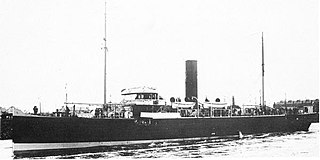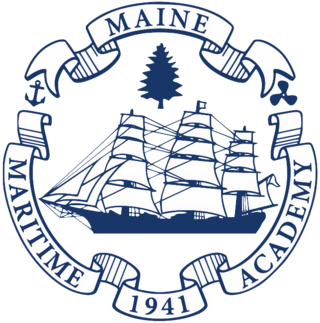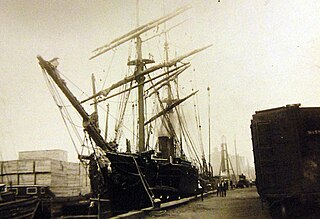A mariner is a sailor.
Contents
Mariner or Mariners may also refer to:
A mariner is a sailor.
Mariner or Mariners may also refer to:

Q-ships, also known as Q-boats, decoy vessels, special service ships, or mystery ships, were heavily armed merchant ships with concealed weaponry, designed to lure submarines into making surface attacks. This gave Q-ships the chance to open fire and sink them.

The Portsmouth Naval Shipyard, often called the Portsmouth Navy Yard, is a United States Navy shipyard on Seavey's Island in Kittery, Maine, bordering Portsmouth, New Hampshire. The naval yard lies along the southern boundary of Maine on the Piscataqua River.
Captain is a rank or title for commander of a military unit, commander of a ship or other vessel, or leader of a unit or organization.

The second USS Boston was a 24-gun frigate, launched 3 June 1776 by Stephen and Ralph Cross, Newburyport, Massachusetts, and completed the following year. In American service she captured a number of British vessels. The British captured Boston at the fall of Charleston, South Carolina, renamed her HMS Charlestown, and took her into service. She was engaged in one major fight with two French frigates, which she survived and which saved the convoy she was protecting. The British sold Charlestown in 1783, immediately after the end of the war.

The United States Merchant Marine is an organization composed of United States civilian mariners and U.S. civilian and federally owned merchant vessels. Both the civilian mariners and the merchant vessels are managed by a combination of the government and private sectors, and engage in commerce or transportation of goods and services in and out of the navigable waters of the United States. The Merchant Marine primarily transports domestic and international cargo and passengers during peacetime, and operate and maintain deep-sea merchant ships, tugboats, towboats, ferries, dredges, excursion vessels, charter boats and other waterborne craft on the oceans, the Great Lakes, rivers, canals, harbors, and other waterways. In times of war, the Merchant Marine can be an auxiliary to the United States Navy, and can be called upon to deliver military personnel and materiel for the military.

USS Ranger was a sloop-of-war in the Continental Navy, serving from 1777–1780 and the first to bear her name. Built at Portsmouth Naval Shipyard on Badger's Island in Kittery, Maine, she is famed for the solo raiding campaign carried out by her first captain, John Paul Jones, during naval operations of the American Revolutionary War. In six months spent primarily in British waters, she captured five prizes, staged a single failed attack on the English mainland at Whitehaven, and caused Royal Navy ships to be dispatched against her in the Irish Sea.

Joshua Barney was an American Navy officer who served in the Continental Navy during the Revolutionary War and as a captain in the French Navy during the French Revolutionary Wars. He later achieved the rank of commodore in the United States Navy and also served in the War of 1812.

USS Plymouth, a wooden-hulled screw sloop-of-war, was the second ship of the United States Navy to be named for Plymouth, Massachusetts.

Maine Maritime Academy is a public college focused on maritime training and located in Castine, Maine. The academy was established by the 90th Maine Legislature on March 21, 1941. Unlike federal service academies, a congressional recommendation is not required to attend this state school. Students are not obligated to go to sea or into the military after graduation, and a large portion of the graduating class chooses shore-side employment, often in maritime-related fields or the power generation industry.

HMD Bermuda was the principal base of the Royal Navy in the Western Atlantic between American independence and the Cold War. The Imperial fortress colony of Bermuda had occupied a useful position astride the homeward leg taken by many European vessels from the New World since before its settlement by England in 1609. French privateers may have used the islands as a staging place for operations against Spanish galleons in the 16th century. Bermudian privateers certainly played a role in many English and British wars following settlement, with its utility as a base for his privateers leading to the Earl of Warwick, the namesake of Warwick Parish, becoming the most important investor of the Somers Isles Company. Despite this, it was not until the loss of bases on most of the North American Atlantic seaboard threatened Britain's supremacy in the Western Atlantic that the island assumed great importance as a naval base. In 1818 the Royal Naval Dockyard, Bermuda officially replaced the Royal Naval Dockyard, Halifax, as the British headquarters for the North America Station (which would become the North America and West Indies Station after absorbing the Jamaica Station in 1830.
HMS Investigator was a survey sloop of the Royal Navy. She was purchased in 1823 for service in Indian waters.

American colonial marines were various naval infantry units which served during the Revolutionary War on the Patriot side. After the conflict broke out in 1775, nine of the rebelling Thirteen Colonies established state navies to carry out naval operations. Accordingly, several marine units were raised to serve as an infantry component aboard the ships of these navies. The marines, along with the navies they served in, were intended initially as a stopgap measure to provide the Patriots with naval capabilities before the Continental Navy reached a significant level of strength. After its establishment, state navies, and the marines serving in them, participated in several operations alongside the Continental Navy and its marines.

The Battle of Dogger Bank on 10 February 1916 was a naval engagement between the Kaiserliche Marine of the German Empire and the Royal Navy of the United Kingdom, during the First World War. Three German torpedo boat flotillas sortied into the North Sea and encountered the British 10th Sloop Flotilla near Dogger Bank. The German vessels eventually engaged the British vessels, after mistaking them for cruisers instead of minesweeping sloops. Knowing they were out-gunned, the British attempted to flee and in the chase, the sloop HMS Arabis was sunk, before the British squadron escaped. As the cruisers of the Harwich Force returned to port, the light cruiser HMS Arethusa struck a mine, ran aground and broke in two. Although the Germans were victorious, they inflated the victory by reporting that they had sunk two cruisers.
Hector McNeill was an Scotch-Irish immigrant to the Province of Massachusetts Bay who became a merchant mariner for the Royal Navy during the North American theater of the Seven Years' War (1756–1763). He later became the third ranking officer in the Continental Navy during the American Revolutionary War.

HMS Pelican was an Osprey-class sloop built for the Royal Navy in the mid-1870s. She was launched in 1877 and was sold to the Hudson's Bay Company in 1901. She was scuttled in 1953.

A sailor, seaman, mariner, or seafarer is a person who works aboard a watercraft as part of its crew, and may work in any one of a number of different fields that are related to the operation and maintenance of a ship.
Portland most commonly refers to:
The following index is provided as an overview of and topical guide to Wikipedia's articles on recreational dive sites. The level of coverage may vary:
M & J Tracy Inc. was a shipping and tugboat towing company founded in New York City by the racy brothers in 1881, as M & J Tracy Transportation company. The brothers: John Tracy, Michael J. Tracy and Thomas Tracy founded the Tracy Towing Line in 1917. The brother's sisters: Catherine Tracy and Helen Tracy were on the company's board. M & J Tracy Inc. office was located at 1 Broadway in New York City and had a field office in Brooklyn. The Tracy companies owned both owned tugboats and barges. Early work was transporting coal to New York Harbor port in barges. M & J Tracy Inc. supported the World War II effort by operating United States tugboats and ships. After the war, M & J Tracy Inc. purchased some surplus ships. M & J Tracy Inc. also operated the M & J Tracy New York Harbor Industrial site. The family lived in the Frank J. Helmle 1912 Tracy Mansion at 105 8th Avenue, Brooklyn, New York, now a 7 unit Condo. John Tracy founded the Maritime Association of the Port of New York. John Tracy was born in 1855 and died on October 1, 1931. Michael J, Tracy died on November 7, 1927,